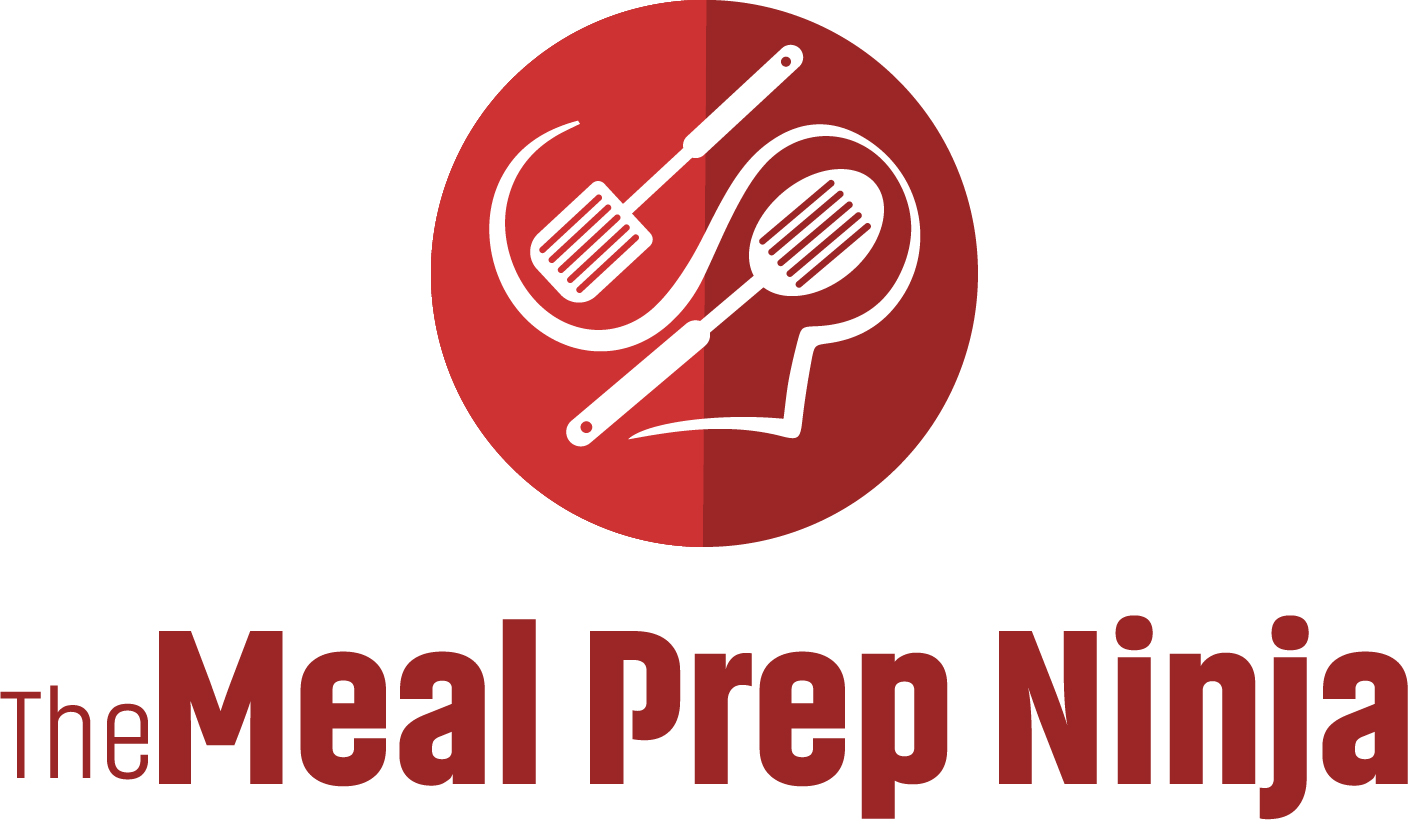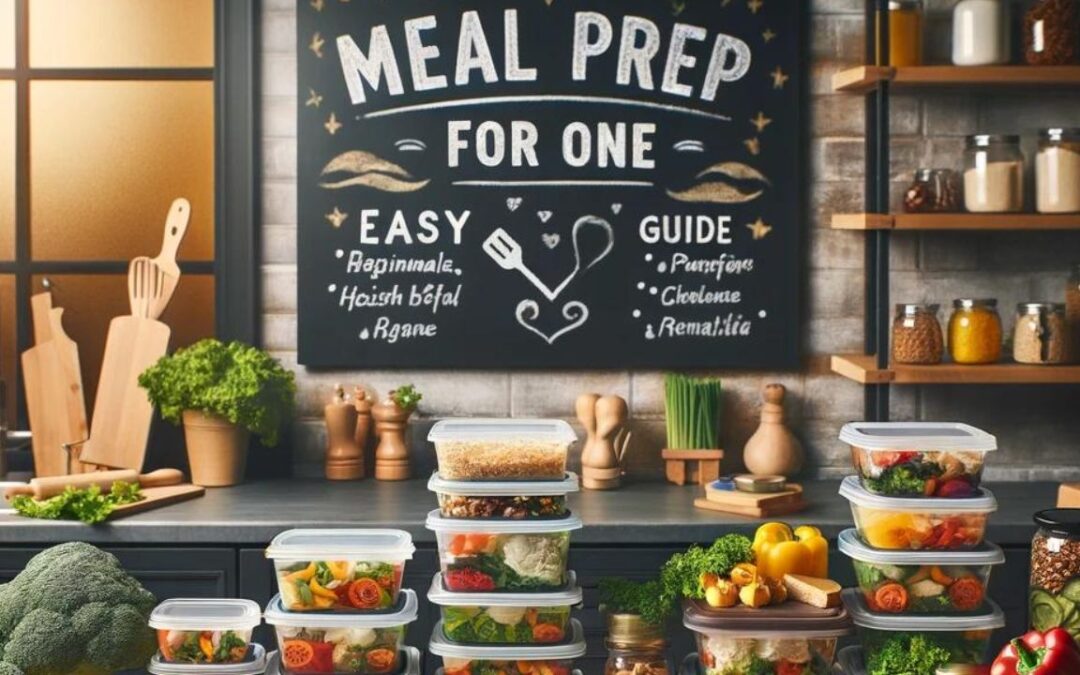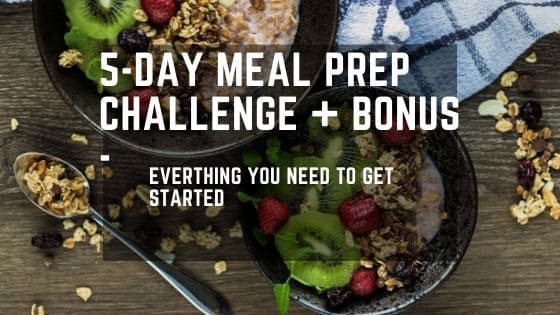Last Updated on March 10, 2024 by TheMealPrepNinja
Are you a solo cook looking to streamline your cooking process or a beginner who wants to learn the basics of meal prepping? If so, you’ve come to the right place.
In this easy guide, I will provide you with essential strategies, tips, and recipes to get started with meal prep for one person. Whether you’re a busy professional, a student living alone, or simply someone who enjoys cooking for themselves, this guide will help you save time, money, and make delicious and nutritious meals.
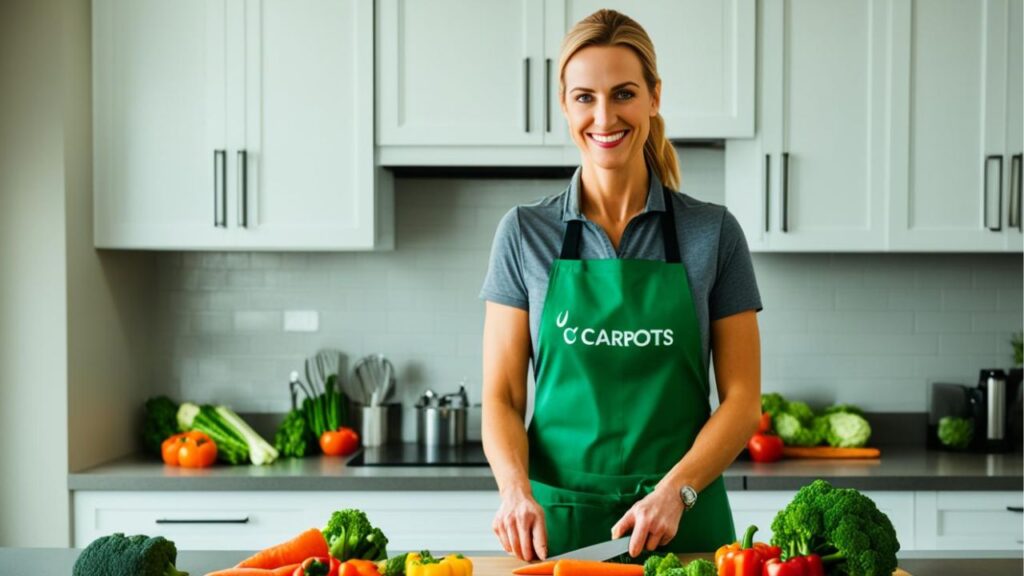
Key Takeaways:
- Meal prep is a popular trend that involves preparing meals in advance and portioning them out for later consumption.
- Meal prep for one person can help you save time, money, and reduce food waste.
- By following this easy guide, you can learn essential strategies, tips, and recipes to get started with meal prep for one.
- From efficient kitchen organization to smart grocery shopping, this guide covers all the necessary steps to make your meal prep journey a success.
- By incorporating meal prep into your routine, you can have delicious and nutritious meals ready to enjoy throughout the week.
This post may contain affiliate links, which means we may receive a commission, at no extra cost to you, if you purchase through a link.
Understanding Meal Prep for One Person Beginners
In this section, I will explore the rise of meal prepping as a popular food trend and its various benefits. We will also discuss whether meal prepping is the right choice for you and provide essential meal prep strategies specifically tailored for solo cooks. Understanding these concepts will lay the foundation for successful meal prepping.
The Rise of Meal Prepping and Its Benefits
The rise of meal prepping has gained significant momentum in recent years, catering to busy individuals, health-conscious eaters, and those looking to save time and money. The convenience and practicality of meal prepping have made it a go-to solution for many people.
One of the key benefits of meal prepping is the ability to save time. By preparing meals in advance, you can eliminate the need for daily cooking, making it easier to stick to a schedule and avoid the stress of deciding what to eat each day.
Meal prepping also offers financial advantages. By planning your meals and buying ingredients in bulk, you can reduce food waste and cut down on unnecessary spending. This not only benefits your wallet but also contributes to a more sustainable lifestyle.
Meal prepping allows for better portion control, ensuring that you consume balanced and nutritious meals. By pre-portioning your meals, you can avoid overeating and maintain a healthy diet.
Is Meal Prepping Right for You?
While meal prepping offers numerous benefits, it may not be suitable for everyone. It’s essential to consider your personal preferences and lifestyle before diving into meal prep.
If you’re someone who values efficient mealtime preparation, likes to have a variety of meals readily available, and wants to develop better eating habits, then meal prepping is likely a great fit for you. It is especially beneficial for individuals who lead busy lives or have limited time for cooking during the week.
However, if you enjoy the spontaneity of choosing and cooking meals each day or prefer freshly prepared dishes, meal prepping may not align with your culinary preferences.
Essential Meal Prep Strategies for Solo Cooks
Meal prepping for one person requires specific strategies to ensure efficiency and practicality. Here are some key tips for successful solo meal preparation:
- Plan your meals in advance: Take time to create a meal plan for the week, including breakfast, lunch, dinner, and snacks. This will help you stay organized and ensure you have all the ingredients you need.
- Cook in batches: Prepare large quantities of a particular dish and portion it into individual servings. This saves time and allows you to have a variety of meals throughout the week.
- Invest in quality storage containers: Use containers that are suitable for freezing, refrigeration, and reheating. This will help maintain the freshness and quality of your prepared meals.
- Create a meal prep schedule: Set aside a specific day or time each week for meal prep. This helps establish a routine and makes it easier to incorporate into your schedule.
- Utilize versatile ingredients: Choose ingredients that can be used in multiple recipes to minimize waste and maximize variety in your meals.
By following these essential meal prep strategies, you can streamline your solo cooking process and ensure that you are well-prepared for the week ahead.
Getting Started with Solo Meal Prep
Are you ready to embark on your journey of solo meal prep? This section will guide you through the essential steps and provide you with the necessary tools to get started.
By following these guidelines, you’ll be well-equipped to make meal preparation a seamless and efficient part of your routine.
Before diving into meal prep, it’s important first to understand the basic essentials. Having the right equipment and a well-planned approach will set you up for success.
Here are the key meal prep essentials for beginners:
- Meal prep containers: Invest in reusable containers of different sizes to store and portion out your meals.
- Sharp knives and cutting boards: A good-quality knife and cutting board will make meal prep easier and safer.
- Measuring tools: Measuring cups and spoons will ensure accurate portion sizes and consistent flavors.
- Food storage bags and labels: These will come in handy for freezing individual portions or storing prepped ingredients.
- Meal prep recipes and meal plan templates: Start with a few simple recipes and create a meal plan to guide your preparation.
Now that you have the essentials, let’s walk through the steps to get started with solo meal prep:
- Plan Your Meals: Decide on the number of meals you want to prep for the week. Consider your dietary preferences, nutritional needs, and any upcoming events that may affect your schedule.
- Choose Recipes: Select recipes that are simple, nutritious, and appealing to you. Look for recipes that use similar ingredients to minimize waste and maximize efficiency.
- Make a Grocery List: Based on your chosen recipes, make a detailed grocery list. Include all the ingredients you’ll need for your week of meal prep.
- Shop for Ingredients: Take your grocery list to the store and purchase all the necessary ingredients. Stick to your list to avoid impulse buys.
- Prep and Cook: Set aside a dedicated time to prep and cook your meals. Chop vegetables, marinate proteins, and cook in bulk to save time throughout the week.
- Portion and Store: Divide your cooked meals into individual portions using your meal prep containers. Label them with the date and contents for easy identification.
- Refrigerate or Freeze: Depending on the shelf life of your prepared meals, store them in the refrigerator or freezer. Be mindful of proper food storage guidelines to maintain freshness and avoid spoilage.
- Enjoy: Throughout the week, simply grab your prepped meals and heat them up when you’re ready to eat. Enjoy the convenience of having healthy, homemade meals at your fingertips.
With these steps and essentials in mind, you’re now ready to dive into the world of solo meal prep. Experiment with recipes, personalize your meal plan, and discover the joy of having nourishing meals readily available.
Smart Grocery Shopping for Single Serving Meal Prep
Grocery shopping is a crucial step in the meal prep process, especially when you’re preparing meals for one person. By shopping smart and making strategic choices, you can ensure that you have all the necessary ingredients for your single-serving meal prep. In this section, I’ll share tips for crafting a simple grocery shopping list and choosing budget-friendly and nutritious ingredients for your meals.
Crafting a Simple Grocery Shopping List
Creating a well-planned grocery shopping list is essential to avoid impulse purchases and ensure that you have everything you need for your meal prep. Here are some helpful tips for crafting a simple yet comprehensive grocery shopping list:
- Plan your meals: Before making your list, decide on the meals you want to prepare for the week. This will help you identify the specific ingredients you need.
- Take inventory: Check your pantry, refrigerator, and freezer to see what ingredients you already have on hand. This will prevent you from buying duplicates and help you utilize what you already have.
- Write it down: Jot down the ingredients needed for each meal, making sure to include quantities. This will ensure that you don’t forget any essential items.
- Categorize your list: Organize your list by sections such as produce, protein, grains, pantry staples, etc. This will make your shopping trip more efficient and prevent you from missing any items.
By following these simple steps, you can create a grocery shopping list that is tailored to your single serving meal prep needs.
Choosing Budget-Friendly and Nutritious Ingredients
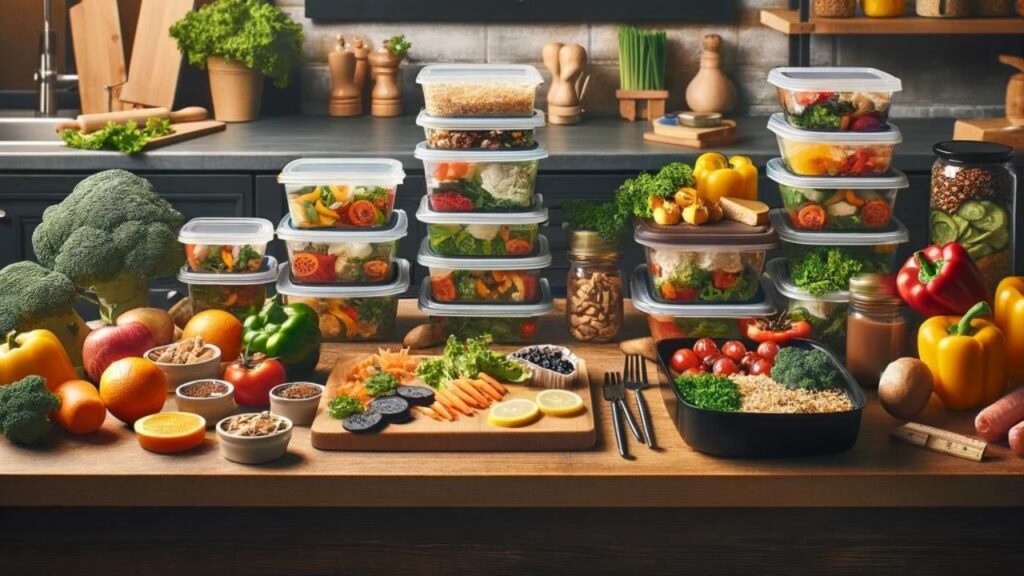
When it comes to meal prep, it’s important to choose ingredients that are both budget-friendly and packed with nutrients. Here are some strategies to help you make the best choices:
- Opt for seasonal produce: Seasonal fruits and vegetables are often more affordable and fresher. They also add variety and flavor to your meals.
- Buy in bulk: Purchasing staple items like grains, beans, and nuts in bulk can save you money in the long run. Just make sure to store them properly to maintain their freshness.
- Consider frozen options: Frozen fruits and vegetables are a great alternative to fresh produce, especially when certain items are out of season. They are often more affordable and retain their nutritional value.
- Compare prices: Take the time to compare prices and brands to make the most cost-effective choices. Consider using store flyers or shopping apps to find the best deals.
- Read labels: Pay attention to the nutritional information on packaged foods. Look for options with minimal additives and ingredients you can pronounce.
These tips will help you strike a balance between your budget and your nutritional goals when selecting ingredients for single serving meal prep.
Efficient Kitchen Organization and Prep Tips
An organized and efficient kitchen is crucial for smooth meal prep. Follow these tips to maximize your kitchen space and set up your kitchen for efficient and streamlined cooking.
Maximizing Kitchen Space
1. Clear the clutter: Start by decluttering your kitchen and getting rid of any unnecessary items. This will create more space and make it easier to find what you need.
2. Utilize vertical space: Install hooks on the walls or hang shelves to make use of vertical space. This will free up counter space and keep your utensils and tools easily accessible.
3. Organize cabinets and drawers: Use drawer dividers and cabinet organizers to keep your pots, pans, and utensils neatly arranged. This will make it easy to find what you need and avoid unnecessary searching and frustration.
4. Install a pegboard: A pegboard is a versatile organizing solution. Hang it on the wall and use it to store your knives, cutting boards, and other frequently used kitchen tools. This will keep them within reach and save valuable drawer space.
5. Optimize pantry storage: Invest in clear storage containers to store dry goods and ingredients in your pantry. This will help you see what you have on hand and prevent food from going to waste.
Essential Tools and Equipment for Meal Prep
Having the right tools and equipment can make a big difference in your meal prep efficiency. Here are some essential items:
- Cutting boards
- Quality knives
- Measuring cups and spoons
- Mixing bowls
- Food storage containers
- Sheet pans
- Saucepans and pots
- Slow cooker or Instant Pot
- Blender or food processor
Investing in these essential tools will make your meal prep tasks easier and more efficient.
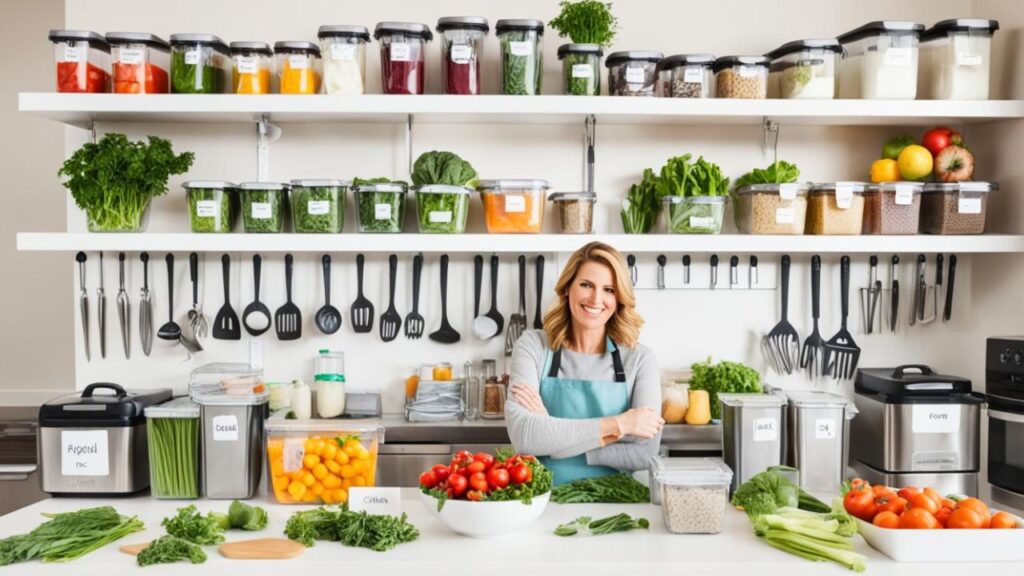
Creating a Personalized Meal Plan and Schedule
A personalized meal plan and schedule are essential for successful meal prep. By tailoring your meals to your dietary goals and preferences, you can ensure that your meal prep journey is enjoyable and sustainable. Additionally, designing a flexible meal schedule allows you to accommodate your busy lifestyle while still prioritizing nutritious meals. In this section, I will guide you through the process of creating a personalized meal plan and schedule.
Assessing Your Dietary Goals and Preferences
Before diving into meal planning, it’s crucial to assess your dietary goals and preferences. Consider your health objectives, such as weight management or specific dietary restrictions. Think about the type of foods you enjoy and those that align with your goals. Take note of any allergies or intolerances that may affect your meal choices.
Once you have a clear understanding of your goals and preferences, you can begin crafting a meal plan that caters to your needs. Include a variety of nutrient-dense foods to ensure a well-balanced diet and explore new recipes to keep your meals exciting.
Designing a Flexible Meal Schedule
Achieving a successful meal prep routine requires a flexible meal schedule that fits your lifestyle. As a busy individual, it’s important to design a meal plan that allows for adaptability and convenience.
Consider the following tips when designing your flexible meal schedule:
- Plan for busy days: Identify the days when you have limited time for cooking and plan meals that require minimal preparation, such as make-ahead salads or slow cooker recipes.
- Prepare versatile ingredients: Choose ingredients that can be used in multiple meals throughout the week. For example, roast a batch of vegetables that can be added to salads, bowls, or wraps.
- Create a backup plan: Have a few backup meal options for days when unexpected events occur, and you may not have time to cook. This could include keeping nutritious frozen meals or having healthy takeout options available.
- Allow for flexibility: Don’t be afraid to switch up your meal plan as necessary. Life happens, and being able to adapt your meals to unexpected changes will help maintain your meal prep routine.
By creating a personalized meal plan and schedule, you’ll be able to incorporate meal prep seamlessly into your daily routine. It ensures that you have delicious, healthy meals ready to enjoy, even on your busiest days.
| Meal Planning Tips: | Benefits: |
|---|---|
| Include a variety of fruits, vegetables, whole grains, and lean proteins. | Ensures a well-balanced diet and optimal nutrient intake. |
| Prep ingredients in advance, such as chopping vegetables or marinating meats. | Saves time during meal preparation and makes cooking more efficient. |
| Batch cook recipes and portion them into individual containers. | Reduces the need for daily cooking and promotes portion control. |
| Consider your schedule and choose meals that align with your daily routine. | Makes meal prep more manageable and sustainable. |
Easy Meal Prep Ideas for One
Are you a solo cook looking for easy meal prep ideas for one person? Look no further! In this section, I’ll share a variety of quick and simple meal prep recipes that are perfect for solo cooks like you. Whether you’re craving healthy options or want to try something new, these ideas will inspire you to make delicious meals in advance.
When it comes to meal prep for one, it’s important to choose recipes that are convenient and offer single-serving portions. This way, you can easily portion out your meals for the week and have them ready to go whenever hunger strikes. To add some variety to your meal prep, experiment with different flavors, cuisines, and cooking techniques.
One easy meal prep idea is Mason jar salads. Assemble layers of your favorite vegetables, proteins, and dressings in a Mason jar to create a grab-and-go lunch. Another option is to prepare a big batch of roasted vegetables and use them throughout the week for salads, wraps, or grain bowls.
If you’re looking for a protein-packed meal, consider making a big pot of chili or soup. These dishes can be portioned out into individual containers and easily reheated whenever you need a quick and satisfying meal. Additionally, stir-fries and sheet pan meals are great options for one-person meal prep as they allow you to cook multiple components at once.
For those with a sweet tooth, overnight oats or chia pudding can be prepared in advance and enjoyed as a quick and nutritious breakfast. You can customize these recipes with your favorite toppings and flavors to keep things interesting.
Remember, the key to successful meal prep is to choose recipes that fit your taste preferences and dietary needs. Whether you’re following a specific diet or looking to incorporate more nutritious ingredients, there are endless possibilities for easy meal prep ideas for one person.
Now that you have some inspiration, it’s time to get cooking! Experiment with these meal prep ideas and discover your favorite recipes for solo cooking. With a little planning and preparation, you can enjoy delicious and convenient meals throughout the week.
Batch Cooking and Storage Solutions
Mastering the Art of Pre-Cooked Meals Storage
Proper storage is crucial for maintaining the freshness and quality of your pre-cooked meals. By mastering the art of pre-cooked meals storage, you can ensure that your meals stay delicious and safe to consume. Here are some valuable tips and strategies to help you achieve optimal storage solutions for your meal prep:
- Use airtight containers: Invest in high-quality, airtight containers to store your pre-cooked meals. This will help prevent moisture and air from seeping in, keeping your meals fresh for longer.
- Label and date your containers: To stay organized and prevent confusion, label each container with the name of the meal and the date it was prepared. This will make it easier for you to keep track of your meals and ensure you consume them before they expire.
- Portion control: Divide your pre-cooked meals into individual portions before storing them. This will make it easier to grab a meal whenever you need it and avoid wasting excess food.
- Freeze or refrigerate promptly: As soon as your meals have cooled down, place them in the freezer or refrigerator promptly to prevent bacterial growth. Follow the recommended storage times for each type of food to maintain its quality.
- Utilize freezer-safe bags: For meals that you plan to freeze, consider using freezer-safe bags. These bags take up less space and can be easily stacked in your freezer.
Utilizing Freezers and Refrigeration Effectively
Freezers and refrigerators are valuable tools for meal prep storage. By utilizing them effectively, you can extend the shelf life of your pre-cooked meals and ensure they remain safe to consume. Here are some tips to help you make the most of your freezer and refrigerator:
- Freeze individual portions: Divide your pre-cooked meals into individual portions and freeze them separately. This way, you can thaw and heat up only what you need, preventing waste.
- Consider freezer-friendly recipes: There are certain meals that freeze better than others. Opt for recipes that are freezer-friendly, such as soups, casseroles, and stews, as they tend to maintain their texture and flavor after thawing.
- Organize your freezer: Keep your freezer organized by placing older meals in front and newer ones in the back. This will help you rotate your meals and ensure nothing gets forgotten.
- Maximize refrigerator space: Utilize refrigerator storage solutions such as clear containers, stackable bins, and lazy susans to maximize space and keep your pre-cooked meals easily accessible.
- Follow safe thawing practices: When thawing your pre-cooked meals, ensure you follow safe thawing practices. Thaw in the refrigerator overnight or use the defrost function on your microwave to thaw them quickly and safely.
By mastering batch cooking and storage solutions, you can make the most of your pre-cooked meals and ensure a seamless meal prep experience. Proper storage techniques and effective use of freezers and refrigeration will help you save time and maintain the quality of your meals for days to come.
Quick and Simple Meal Prep Recipes for One Person
When it comes to meal prepping for one person, simplicity and efficiency are key. Here, I have curated a selection of quick and simple meal prep recipes that are perfect for solo cooks. These recipes not only prioritize nutrition and taste but also incorporate time-saving cooking techniques to make your meal prep process a breeze.
Healthy Recipes and Time-Saving Cooking Techniques
Preparing healthy meals doesn’t have to be complicated or time-consuming. With these meal prep recipes, you can nourish your body with wholesome ingredients without spending hours in the kitchen. Incorporating time-saving cooking techniques like sheet pan meals and one-pot recipes, you can keep your preparation and cooking time to a minimum while still enjoying delicious, nutritious meals.
Some quick and simple meal prep ideas that you can try include:
- Grilled Chicken and Roasted Vegetables: Marinate chicken breasts overnight, then grill them along with a variety of seasonal vegetables in the oven. Divide the chicken and vegetables into individual containers for easy grab-and-go meals throughout the week.
- Quinoa Salad with Chickpeas and Lemon Dressing: Cook a batch of quinoa and toss it with chickpeas, fresh vegetables, and a zesty lemon dressing. This salad can be enjoyed cold or warmed up, making it a versatile option for meal prepping.
- Veggie Stir-Fry with Brown Rice: Sauté a medley of colorful vegetables in a hot pan, then serve them over cooked brown rice. You can customize the stir-fry with your favorite seasonings or sauces to add extra flavor.
Healthy Shrimp Meal Prep Recipe G Hughes Sugar Free BBQ Sauce
Chicken and Rice That Tastes Amazing
Healthy Burrito Bowl Meal Prep Ground Chicken Recipe
These recipes are just the beginning. Feel free to experiment with different ingredients, flavors, and cooking techniques to create a variety of healthy meal prep options that suit your taste preferences.
Prepping for Varied Meals to Avoid Monotony
One of the challenges of meal prepping for one person is avoiding monotony in your meals. To keep things interesting and prevent culinary boredom, it’s essential to prep for varied meals.
One way to achieve variety is by prepping different proteins, grains, and vegetables that can be mixed and matched throughout the week. For example, cook a batch of grilled chicken, roasted salmon, and tofu to have a range of protein options. Pair them with different grains like quinoa, brown rice, and couscous, and add in a variety of steamed or roasted vegetables to create diverse meal combinations.
Additionally, consider incorporating different flavors and cuisines into your meal prep. Experiment with spices, herbs, and sauces from around the world to add a burst of flavor to your dishes. From Mexican-inspired fajita bowls to Mediterranean-inspired grain salads, the possibilities are endless.
By prepping for variety, you can ensure that each meal is exciting and enjoyable, making your meal prep experience a truly satisfying one.
So, get ready to embark on your meal prep journey with these quick and simple recipes. With a focus on healthy ingredients, time-saving techniques, and variety, you’ll be able to enjoy delicious and nutritious meals throughout the week without the hassle of daily cooking.
Weekday Meal Prep for Singles with Busy Schedules
For individuals with busy schedules, weekday meal prep can be a game-changer. It allows you to save time and ensure that you have delicious and nutritious meals ready to enjoy even on your busiest days. Here are some practical tips and ideas to help you with your weekday meal prep:
- Plan your meals: Take some time at the beginning of the week to plan out your meals. This will help you stay organized and ensure that you have all the ingredients you need on hand.
- Choose quick and easy recipes: Opt for recipes that are simple and require minimal preparation and cooking time. Look for meals that can be made in one pot or utilize time-saving cooking techniques.
- Prep ingredients in advance: Take advantage of your free time on the weekends or evenings to do some meal prep. Chop vegetables, marinate proteins, and portion out ingredients to save time during the week.
- Utilize versatile ingredients: Choose ingredients that can be used in multiple meals throughout the week. For example, roast a whole chicken and use the leftover meat in sandwiches, salads, or stir-fries.
- Invest in convenient storage containers: Use containers that are microwave and freezer-safe for storing your prepared meals. This will make it easy to reheat and enjoy your meals throughout the week.
- Make use of the freezer: Prepare large batches of your favorite dishes and freeze individual portions. This way, you’ll always have a quick and easy meal on hand, even on days when you don’t have time to cook.
- Take advantage of meal kits: Consider subscribing to a meal kit service that offers single-serving options. These kits provide pre-portioned ingredients and easy-to-follow recipes, saving you time and effort.
By incorporating these time-saving meal prep tips into your routine, you can enjoy delicious and nutritious meals throughout the week, even when you’re short on time. Remember to prioritize self-care and nourishment, even on your busiest days. You can meal prep for one or meal prep for a family.
Minimizing Cleanup: One-Pot Meals and Skillet Dinners
Minimizing cleanup is a major advantage of meal prep. When it comes to efficient and time-saving cooking methods, one-pot meals and skillet dinners are the perfect solution. Not only do these cooking techniques simplify the preparation process, but they also result in minimal cleanup afterwards. With just one pot or skillet, you can create delicious and nutritious meals with ease.
One-pot meals are a convenient option for easy cleanup. They involve cooking all the ingredients together in a single pot, allowing the flavors to blend and the cleanup to be a breeze. From hearty soups and stews to flavorful pasta dishes and stir-fries, the possibilities are endless when it comes to one-pot meals. Simply throw in your ingredients, let them cook, and enjoy a delicious meal while minimizing the number of dirty dishes.
Skillet dinners are another time-saving cooking method that reduces cleanup. With a skillet, you can cook your protein, vegetables, and grains all in one pan. From quick stir-fries and sautés to flavorful skillet casseroles and frittatas, the versatility of a skillet allows you to create a variety of meals with minimal effort and cleanup. Plus, the combination of flavors that develop from cooking everything in one pan adds an extra level of deliciousness to your meals.
By incorporating one-pot meals and skillet dinners into your meal prep routine, you can streamline your cooking process and spend less time cleaning up afterwards. Not only will you enjoy tasty and wholesome meals, but you’ll also have more time for the things you love. So grab your favorite pot or skillet and get cooking!
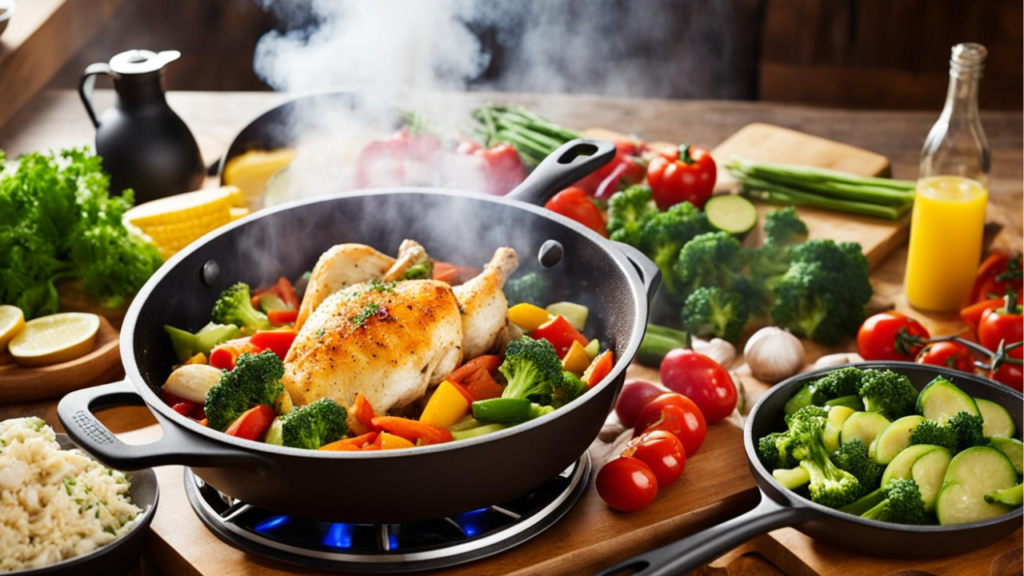
Conclusion
Meal prep is a game-changer when it comes to taking control of your cooking and eating habits. By incorporating meal prep into your routine, you not only save time and money, but you also reduce food waste and ensure that you always have delicious and nutritious meals on hand. It’s a powerful tool that empowers you to make healthier choices and live a more organized lifestyle.
Empowering Yourself Through Meal Prep
Meal prep allows you to take charge of your nutrition and make intentional choices about the food you consume. By planning and preparing your meals in advance, you can customize them to align with your dietary goals and preferences. Whether you’re looking to lose weight, build muscle, or simply eat a balanced diet, meal prep gives you the power to create meals that support your specific needs.
In addition, meal prep helps you develop discipline and consistency in your eating habits. It eliminates the temptation to opt for unhealthy takeout or snack on processed foods when hunger strikes. With pre-prepared meals ready to go, you’ll be less likely to deviate from your health goals and more likely to stay on track.
Sharing Your Meal Prep Success and Tips
One of the most exciting aspects of meal prep is the opportunity to connect with like-minded individuals and share your success stories and tips. By joining online communities, participating in meal prep challenges, or discussing your meal prep journey on social media, you can inspire others and be inspired in return. Sharing your favorite recipes, time-saving techniques, and budget-friendly strategies can foster a supportive and empowering community of meal prep enthusiasts.
Remember, meal prep is a personal journey, and what works for one person may not work for another. Embrace the benefits of meal prep, experiment with different recipes and techniques, and don’t be afraid to share your unique experiences. Together, we can empower each other to live healthier, more organized lives through the power of meal prep.
Check out this article if you want a full meal prep for beginners ultimate guide.
FAQ
What is meal prep?
Meal prep involves preparing meals in advance and portioning them out for later consumption. It is a time-saving and cost-effective way to ensure that you have delicious and nutritious meals ready to enjoy throughout the week.
Why is meal prep beneficial?
Meal prep offers several benefits, including saving time, money, and reducing food waste. It allows you to have healthy meals readily available, eliminates the need for daily cooking, and promotes portion control and balanced eating.
Is meal prepping suitable for individuals who live alone?
Absolutely! Meal prepping is a great option for solo individuals. It allows you to streamline your cooking process, avoid food waste, and ensure that you have portioned meals that suit your dietary needs and preferences.
What are some essential meal prep strategies for solo cooks?
Some essential meal prep strategies for solo cooks include planning your meals in advance, utilizing time-saving cooking methods, investing in versatile kitchen tools, and properly storing pre-cooked meals for maximum freshness.
How do I get started with meal prep for one person?
To get started with meal prep for one person, you will need to assess your dietary goals and preferences, create a meal plan, and ensure you have the necessary tools and ingredients. It’s also essential to set aside dedicated time for meal prep and establish an organized meal schedule.
How do I create a simple grocery shopping list for one person?
When creating a grocery shopping list for one person, consider your meal plan and choose ingredients that can be used in multiple recipes. Opt for budget-friendly options and prioritize nutritious foods, such as fruits, vegetables, lean proteins, and whole grains.
How can I maximize my kitchen space and stay organized for meal prep?
To maximize your kitchen space for meal prep, declutter your countertops, invest in storage solutions like shelves and bins, and utilize vertical space. Make sure your essential tools, utensils, and ingredients are easily accessible for efficient cooking.
How do I create a personalized meal plan and schedule for my solo meal prep?
To create a personalized meal plan and schedule, consider your dietary goals, food preferences, and daily routine. Assess the number of meals you need to prep, choose a variety of recipes, and plan for meals that can be easily adapted throughout the week.
Can you provide some easy meal prep ideas for one person?
Absolutely! Some easy meal prep ideas for one person include overnight oats, stir-fry bowls, sheet pan meals, and salads in jars. These options can be customized to your taste and dietary preferences and can be prepared in advance for convenient meals.
How should I store pre-cooked meals for solo meal prep?
Pre-cooked meals can be stored in airtight containers in the refrigerator or freezer. Make sure to label and date the containers and follow proper food safety guidelines. It’s also helpful to portion out individual servings for easy grab-and-go meals.
Do you have any quick and simple meal prep recipes for one person?
Yes! Some quick and simple meal prep recipes for one person include quinoa and vegetable stir-fry, chicken and broccoli bake, and taco bowls. These recipes are easy to make and can be portioned out for delicious meals throughout the week.
How can I meal prep during busy weekdays?
To meal prep during busy weekdays, prioritize recipes that can be prepared in advance and stored for quick and easy meals. Choose recipes that require minimal cooking time and utilize time-saving cooking methods, such as one-pot meals or slow cooker recipes.
How can I minimize cleanup while meal prepping?
Minimize cleanup by opting for one-pot meals and skillet dinners, which reduce the number of pots and pans used. Use parchment paper or aluminum foil to line baking sheets, and clean as you go to avoid a pile-up of dishes.

Jim Lopez, the founder and editor of The Meal Prep Ninja, shares his journey from a passionate bodybuilder and fitness enthusiast to a certified nutrition coach. Certified by Precision Nutrition, Jim aims to empower others with knowledge on meal prep and nutrition, offering resources for busy individuals to enjoy low-calorie, tasty foods. His blog is a community for sharing healthy eating habits and meal prep recipes
